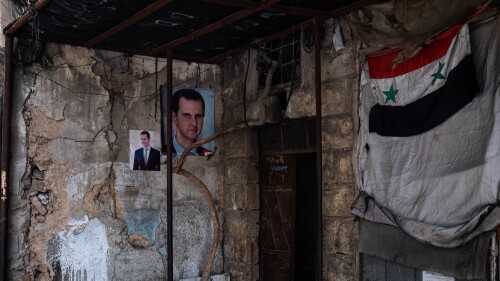The Shah Mosque in Isfahan, empty. |
Something religiously astonishing is taking place in Iran, where an Islamist government has ruled since 1979: Christianity is flourishing. The implications are potentially profound.
Consider some testimonials: David Yeghnazar of Elam Ministries stated in 2018 that “Iranians have become the most open people to the gospel.” The Christian Broadcast Network found, also in 2018, that “Christianity is growing faster in the Islamic Republic of Iran than in any other country.” Shay Khatiri of Johns Hopkins University wrote last year about Iran that “Islam is the fastest shrinking religion there, while Christianity is growing the fastest.”
This trend results from the extreme form of Islam imposed by the theocratic regime. An Iranian church leader explained in 2019: “What if I told you Islam is dead? What if I told you the mosques are empty inside Iran? What if I told you no one follows Islam inside of Iran? ... What if I told you the best evangelist for Jesus was the Ayatollah Khomeini[, the founder of the Islamic Republic]?” An evangelical pastor, formerly an Iranian Muslim, concurred as far back as 2008: “We find ourselves facing what is more than a conversion to the Christian faith. It’s a mass exodus from Islam.”
The flourishing of Christianity results from the extreme form of Islam imposed by the theocratic regime.
As a clandestine phenomenon, the practice of what are sometimes called Muslim Background Believers (MBBs) lacks clergy and church buildings but instead consists of self-starting disciples and tiny house churches of four to five members each, with either hushed singing or none at all. Its lay leadership, in striking contrast to the mullahs who rule Iran, consists mainly of women.
Iranian Christians tend to be fervently pro-Israel.
In another contrast to the government, Iranian MBBs tend to be fervently pro-Israel. They are, explains a documentary, “bowing their knees to the Jewish Messiah – with kindled affection toward the Jewish people.” A convert states, “we fall in love with Jews.” Converts have even expressed a hope to build a “resistance church” in Iran to counter regime threats to Israel.
Given the Iranian house church movement’s underground nature, estimates of its size are necessarily vague. Open Doors found 370,000 MBBs in 2013 and 720,000 in 2020; Duane Alexander Miller approximates as many as 500,000, Hormoz Shariat at least 1,000,000, and GAMAAN even more than that.
The mullahs have usually responded with predictable repression that includes prohibiting Christian missionaries and Gospel preaching. The U.S. State Department reported in 2012 that “Government officials frequently confiscate Christian Bibles and pressure publishing houses printing Bibles ... to cease operations.” Also, Christians “reported the presence of security cameras outside their churches.”
Iranian authorities routinely arrest and jail MBBs, often for extended periods; for example, the United Nations reported in 2013 on “more than 300 Christians” who were arrested in the prior three years, mostly for vague security-related offenses. An inquiry found that “Those arrested have been subjected to intensive and often abusive interrogation.”
The Rev. Hossein Soodmand, executed for apostacy by the Iranian regime in 1990. |
The punishment can be severe: in 1990, for example, the Rev. Hossein Soodmand was executed for apostasy. In 2008, the government advanced legislation to impose the death penalty on anyone born to Muslim parents who converts to another faith. Indeed, “As more Iranians convert,” Khatiri notes, “their situation is getting worse.”
“You’re creating problems in the country,” an Iranian convert reported being told during a 2018 police interrogation. In this spirit, Iran’s Intelligence Minister Mahmoud Alavi in 2019 spoke of his ministry’s research into conversions to Christianity, its questioning of ordinary people, such as sandwich-sellers, to explain their motives, and its efforts to “counter the advocates of Christianity.” Iran’s leading Islamic seminary sees the domestic fight against Christianity as one of its top priorities and former president Mahmoud Ahmadinejad reportedly once vowed to “stop Christianity in this country.” The supreme leader, Ali Khamenei, blames house churches on “Zionists and other enemies.”
Christian satellite television stations have a huge potential audience in Iran. |
Indeed, Lela Gilbert and Arielle Del Turco argue that the regime considers Christianity “an existential threat” to the Islamic Republic. And it should, notes Reza Safa, the Iranian-born founder of Nejat TV (“ministering to Muslims living in Farsi-speaking nations”), who titled a book The Coming Fall of Islam in Iran. He sees Iran’s Christians as “an army of God” who are bringing Iran to “the brink of another revolution, this time orchestrated” by a Christian spirit.
If this analysis is even partially correct, the consequences are enormous. The collapse of Khomeini’s regime would not only fundamentally alter the balance of power in the Middle East; it would also likely terminate the Islamist surge that Iranian revolutionaries forwarded in 1978-79, ending the malign historical cycle that largely began in Iran.
Daniel Pipes is president of the Middle East Forum.










